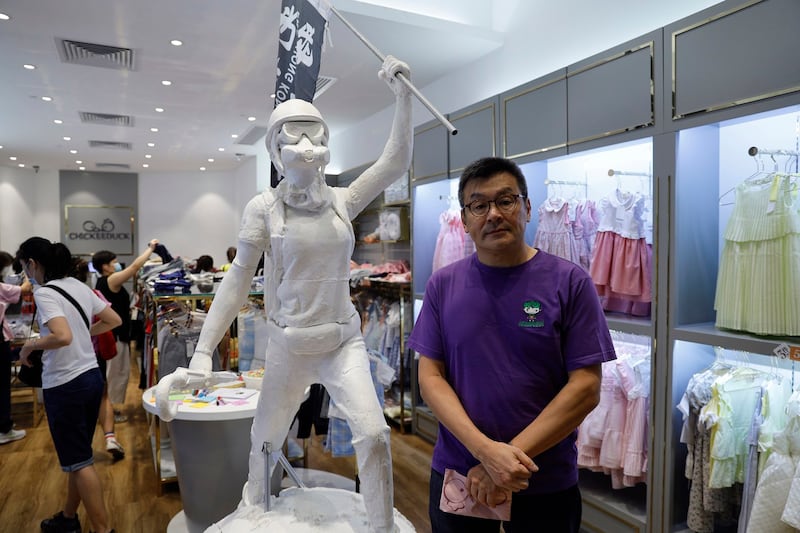National security police in Hong Kong on Thursday arrested two more people on suspicion of funding overseas activists via an app designed to promote pro-democracy businesses.
Lily Wong and Chan Kok-hin, both former members of Nathan Law's now-defunct political party Demosisto, were arrested under a national security law that bans public dissent and peaceful opposition, bringing the total number of arrests linked to the Mee app to seven, rights groups and police said.
"The National Security Department of the Hong Kong Police Force this morning (July 27) arrested a 29-year-old man and a 29-year-old woman for suspected 'conspiracy to collusion with a foreign country or with external elements to endanger national security'," the police said in a statement without naming Wong or Chan.
The pair also stand accused of 'conspiracy to commit an act or acts with seditious intent' under a colonial-era sedition clause in the city's Crimes Ordinance.
"Investigation revealed that the two arrested persons were suspected of having connection with the group of persons arrested on July 5. They are being detained for further enquiries," the police said, adding that more arrests could follow.
The U.S.-based campaign group Hong Kong Democracy Council said via its account on X, formerly known as Twitter, that seven people with links to the Mee app have now been arrested, on suspicion of helping fund exiled former pro-democracy lawmaker Nathan Law's overseas activities.
The London-based rights group Hong Kong Watch commented on its X account: "Concerning to see yet more arrests in #HongKong today, with another 2 ex-Demosisto members detained by the National Security Police."
On July 3, national security police issued arrest warrants and offered bounties for U.K.-based Mung, Kwok, Law and five other exiled campaigners, saying they are wanted in connection with "serious crimes" under Hong Kong's national security law.
Bounties for wanted list figures
U.K.-based Finn Lau, Australia-based Ted Hui and Kevin Yam and U.S.-based Anna Kwok and Elmer Yuen are also on the wanted list, with bounties of HK$1 million (US$127,700) offered for information that might lead to an arrest.
Since then, police have also detained several family members of the "wanted activists," including relatives of Nathan Law, Elmer Yuen, Mung Siu-tat and Dennis Kwok.
The Mee app was set up to benefit companies in the "yellow economic circle," who were supportive of the demands of the 2019 protest movement, which included fully democratic elections.
The color yellow has been associated with the pro-democracy movement since the 2014 umbrella movement, while pro-government and pro-police views are described as "blue."
But since Beijing – which blames the 2019 protests on "hostile foreign forces" seeking to foment a "color revolution" in the city – imposed the national security law, such businesses have been seen as subversive.
In January, national security police arrested six people at a Lunar New Year market for selling "seditious publications" inciting people to overthrow the government, in a reference to pro-democracy movement memorabilia.

Herbert Chow, who was forced to shut down his children's clothing chain Chickeeduck after it was raided by national security police in May 2021 for displaying a statue of a protester, said his "yellow" credentials had massively boosted interest in his high-end products, but that he was unable to keep going due to mounting political pressure exerted via his commercial landlords.
"Back in 2019, when I put a Goddess of Democracy statue in [one of my stores], its rental contract was terminated early despite having just been renewed," Chow told RFA Cantonese in a recent interview.
"The big landlords don't support you ... because you're only paying H.K.$100,000/month in rent for the store, but you're bringing them a whole load of trouble, to the point where they're getting phone calls from [Beijing's] Central Liaison Office," he said.
Businesses targeted
Smaller "yellow" businesses are also being targeted, as the authorities vow to crack down on "soft confrontation" now that thousands of protesters have already been prosecuted for their role in the 2019 movement, sometimes for just being in the area or carrying clothing or equipment associated with the movement.
Former pro-democracy District Council member Derek Chu, who has a long history of social activism, said these pop-up stalls and smaller shops are fast disappearing, and that his landlord recently terminated the lease of his small "yellow circle" shop.
"It's still powerful to use consumer power to win recognition and support these businesses, but the impact is much smaller now," Chu said.
"People start to ask themselves why they have to work so hard when they are making less as a boss [of such businesses] than they would working a part-time job," he said.
Translated by Luisetta Mudie .

